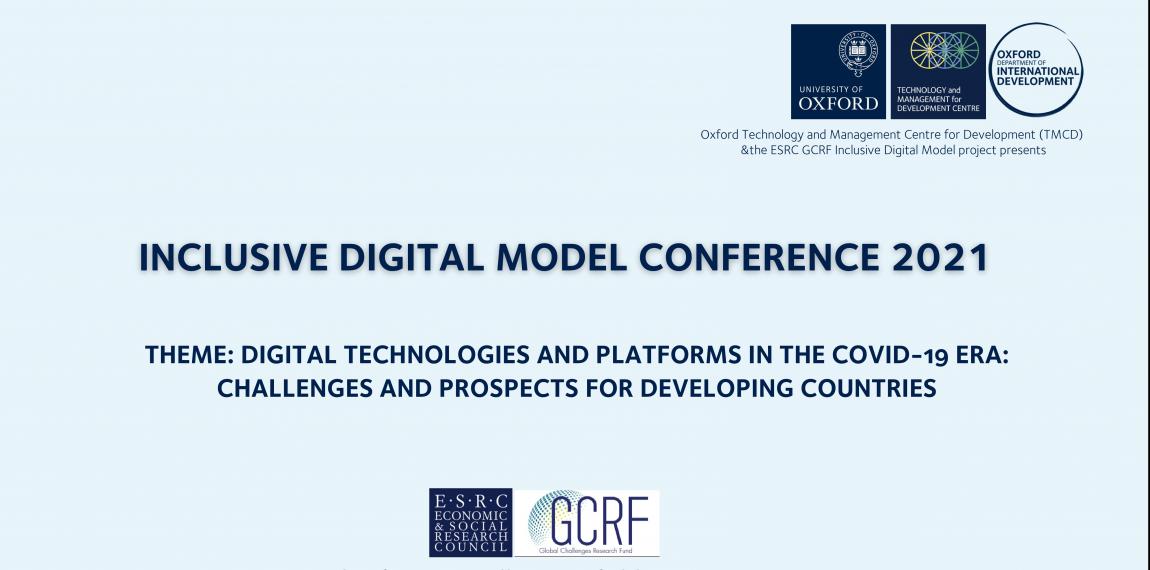
Published
Leading academics, policymakers and business leaders convene to discuss digital technologies and platforms at TMCD online conference
The Inclusive Digital Model (IDMODEL) online conference, organised by the Oxford Technology and Management Centre for Development (TMCD), was held successfully on thursday, the 28th of January 2021. The theme of the conference was 'Digital Technologies and Platforms in the Covid-19 Era: Challenges and Prospects for Developing Countries'.
It was motivated by a desire to reflect on the various ways in which the Covid-19 pandemic has caused changes to digital technology adoption and business models as firms and countries struggle to cope with the challenges posed by the pandemic. Additionally, a central focus of presentations at the conference was on the role of digital platforms and technologies in enabling societies to build resilience and adapt to the challenges presented by the pandemic.
The opening session was chaired by Professor Diego Sánchez-Ancochea, Head of Department, Oxford Department of International Development (ODID) who commended Professor Fu and TMCD for continually producing relevant research which shows the links between technology, industrialisation, and economic development.
Professor, David Gann, CBE, Pro Vice-Chancellor for Development and External Affairs, University of Oxford delivered the welcome speech where he lauded TMCD for providing a platform to discuss these pertinent issues. He reiterated the importance of digital technologies and platforms in developing countries; emphasised the importance of investments in research and development and charged academics to strengthen their collaborations with business and policymakers.
Mr Wu Cheng, Senior Vice President at Tencent delivered the keynote speech, sharing insights on the role digital technologies such as those developed by Tencent have supported SMEs in China, enabling them to overcome the worst effects of the Coronavirus pandemic.
The first session which focused the role of digital technologies in today’s world was chaired by Professor Pervez Ghauri of the University of Birmingham and featured presentations from TMCD Director, Professor Xiaolan Fu; Torbjörn Fredriksson of the United Nations Conference on Trade and Development (UNCTAD), and Marcio Cruz of the World Bank Group.
Professor Fu's presentation highlighted findings from the IDMODEL project which showed the ways through which innovative content-based digital business models can develop the entrepreneurial and technological capabilities of poor people thereby enabling them to create economic and social value.
Mr. Fredriksson’s presentation shared findings on the impact of the coronavirus pandemic on e-commerce from a survey of e-commerce businesses and policy responses in 23 developing countries. The survey showed the role of digital business models in enabling firms to build resilience; it also highlighted how increasing digitisation can accelerate the development gap between countries due to the uneven distribution of technological capabilities.
Mr. Marcio Cruz of the World Bank shared findings from the Covid-19 business pulse survey conducted in over 60 countries. The findings revealed that firms that invested in digital technologies were able to respond and adjust better to the pandemic.
The second session of the conference focused on digital technologies and post-pandemic recovery. The presentation by Mr. Roehrl of the United Nations Department of Economic and Social Affairs (UN DESA) focused on global energy, emissions, and their implications on recovery through digital technologies. He discussed the role of digital technologies in a green and sustainable post-pandemic recovery.
Mrs. Sonia Kabir of the SBK Foundation talked about the digital ecosystem in emerging South Asia including Bangladesh, Myanmar, Nepal, Bhutan, Sri Lanka and Bangladesh. She discussed the role which digital technologies have played in enabling the growth of SMEs, driving inclusion, and building resilience against the negative impacts of the pandemic.
Finally, Professor Pinar Ozcan of the Saïd Business School, University of Oxford discussed platform disruption in regulated markets. Her presentation showed the cross-disciplinary and cross-sectoral boundaries of big technology companies which enable them to be very dynamic.
Guests were also shown a short video of the IDMODEL’s ‘Haate Haat’ app, which supports the development of content-based business models in poor communities. Many participants found the video and presentations by speakers very enlightening; they proceeded to ask questions and made insightful contributions to the conversations.
The closing remarks of the conference were delivered by Professor Xiaolan Fu and Professor Pervez Ghauri. Professor. Ghauri commended institutions such as the World Bank, UN, and UNCTAD for conducting relevant research on digital technologies and urged academics to work closely with them because of the amount of data they possess.
Professor Fu highlighted that the presentations at the conference revealed the role which digital technologies can play in building a more equal world and in driving post-pandemic economic recovery. She thanked the speakers for sharing their critical insights and guests for participating and contributing to the discussions.
Find out more about the IDMODEL Project here.


